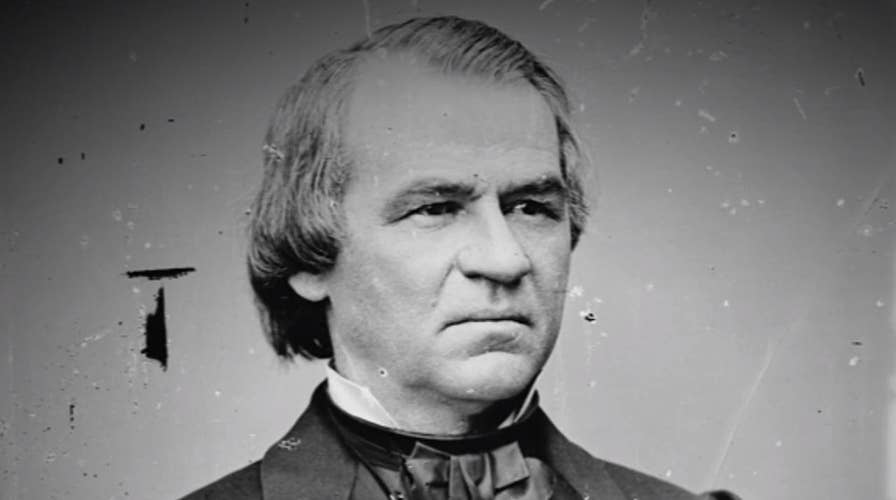In 1868, the House of Representatives resolved -- for the first time in American history -- to impeach the president of the United States.
Fox Nation's new documentary "The First Impeachment," re-examines the history of the nation's seminal experience with a Constitutional crisis of this magnitude, when President Andrew Johnson faced removal from office.
JUDGE NAPOLITANO RECALLS CLINTON IMPEACHMENT, WARNS AMERICA TO BRACE FOR TUMULTUOUS TIME
"It's important to keep in mind what the nation was like in the middle and late 1860s," David Stewart, author of "Impeached: The Trial of President Andrew Johnson and the Fight for Lincoln's Legacy" told Fox Nation. "We've come through the Civil War -- questioning our whole national identity, 700,000 people have been killed. Comparable casualties today would be seven million."
Andrew Johnson came from humble beginnings in Tennessee to eventually become a congressman, governor, and senator, as a Southern Democrat. In 1861, at the outbreak of the Civil War, the state of Tennessee succeeded from the Union, but then-Senator Johnson did not.
'I'VE BEEN CONVERTED BY THE FACTS' MUELLER PROBE WAS A 'WITCH HUNT': GIULIANI'S LAWYER
"He retained his seat in Congress. The Union was important to him," said Stewart. "That made him a much more noticed figure. His reading of the historical moment then was slavery is over. He may have been an advocate for it, [he] supported it all his life but it wasn't going to survive the war and he shifted and understood that."
President Abraham Lincoln, who was concerned with maintaining influence in the southern border states, took notice of Johnson and made him military governor of Tennessee. The big moment for Johnson came in 1864 when Lincoln, a Republican, ran for re-election and sought out a running mate to help him appeal to Democrats and people in the south.
"The person who fit that agenda best was Andrew Johnson... Johnson was put on his ticket -- that's how Johnson ends up as vice president," said Stewart.
Weeks after the election of 1864, newly elected President Lincoln is assassinated. Johnson becomes the 17th president of the United States. He is thrust into the White House as a southern Democrat leading a party of predominately northern Republicans, setting up a conflict that would eventually lead to his impeachment.
"The essential thing he does is he allows the southerners to form their own state governments with basically no federal oversight. Johnson's policy was that the Confederates basically return to power," according to Stewart.
The southern states elected former members of the Confederate army and government to represent them, triggering a standoff with Republicans.
CLICK HERE FOR THE LATEST STORIES FROM FOX NATION
"Republicans in Congress were appalled," Stewart told Fox Nation. "They said these people have the blood of our families on their hands and they refused to let them serve in Congress."
For several years, at least 10 southern states were not represented in Congress. President Johnson saw that as an affront to the spirit of the U.S. system of government, and he continued to oppose Republican-led efforts to impose their will on the former Confederate states.
"[Johnson] vetoes this 1866 civil rights bill, which provides some rights to the freed slaves. [Republicans in Congress] basically give up on Johnson at that point and they stop consulting him, and when they are drafting reconstruction laws... to force the southern states to reconstitute themselves and basically get the Confederates out of power, he's not consulted. He vetoes them all," Stewart said.
In the 1866 Congressional elections, Republicans win across the Northern states and it convinced them that they were on the right side of popular opinion. It encouraged them to start the process of exploring impeachment.
After one botched attempt to pass articles of impeachment, Republicans in Congress set a trap for President Johnson and he seemingly walked right into it, presumably to force a fight with Congress.
PELOSI IN 1998 ON BILL CLINTON'S IMPEACHMENT: 'REPUBLICANS ARE PARALYZED WITH HATRED'
"[Republicans] were trying to protect Edwin Stanton... who had been Lincoln's secretary of war," Stewart recounted to Fox Nation. "He was a strong point of resistance to Johnson's hands-off policy in the south. They do an act, this Tenure of Office Act, which gives the Senate the power to confirm the firing of any executive official... Its final provision says that any violation of this statute is a high crime and misdemeanor."
Stewart continued, "Johnson was way too smart not to know that it was there to trap him and to force him into an impeachment... I think he's decided that that was a fight he wanted to have and take his case basically to the people."
President Johnson eventually fired Stanton and Republicans in the House impeached him, citing among 11 articles of impeachment that he had failed to carry out the Constitutional duties of the executive branch, by refusing to enforce the reconstruction statutes duly passed by Congress.
However, when the Senate took up the issue, Johnson's critics were unable to secure enough votes to remove him from office and he was acquitted. Johnson served out the remainder of his term, but the Democratic party declined to nominate him to run again.
CLICK HERE FOR THE FOX NEWS APP
Stewart told Fox Nation that he believes the impeachment of Johnson ultimately proved to be a positive experience for the country.
"I think the process worked at some important level because it gave people a way to see the drama played out, to hear all the arguments, to see a response to this crisis in an attempt to resolve it. And that gave the country a sense of closure, which allowed that crisis to be averted," he concluded.
To watch all of "The First Impeachment" go to Fox Nation and sign up today.
CLICK HERE TO SIGN UP FOR A FOX NATION FREE TRIAL
Fox Nation programs are viewable on-demand and from your mobile device app, but only for Fox Nation subscribers. Go to Fox Nation to start a free trial and watch the extensive library from Tomi Lahren, Pete Hegseth, Abby Hornacek, Laura Ingraham, Ainsley Earhardt, Greg Gutfeld, Judge Andrew Napolitano and many more of your favorite Fox News personalities.












































